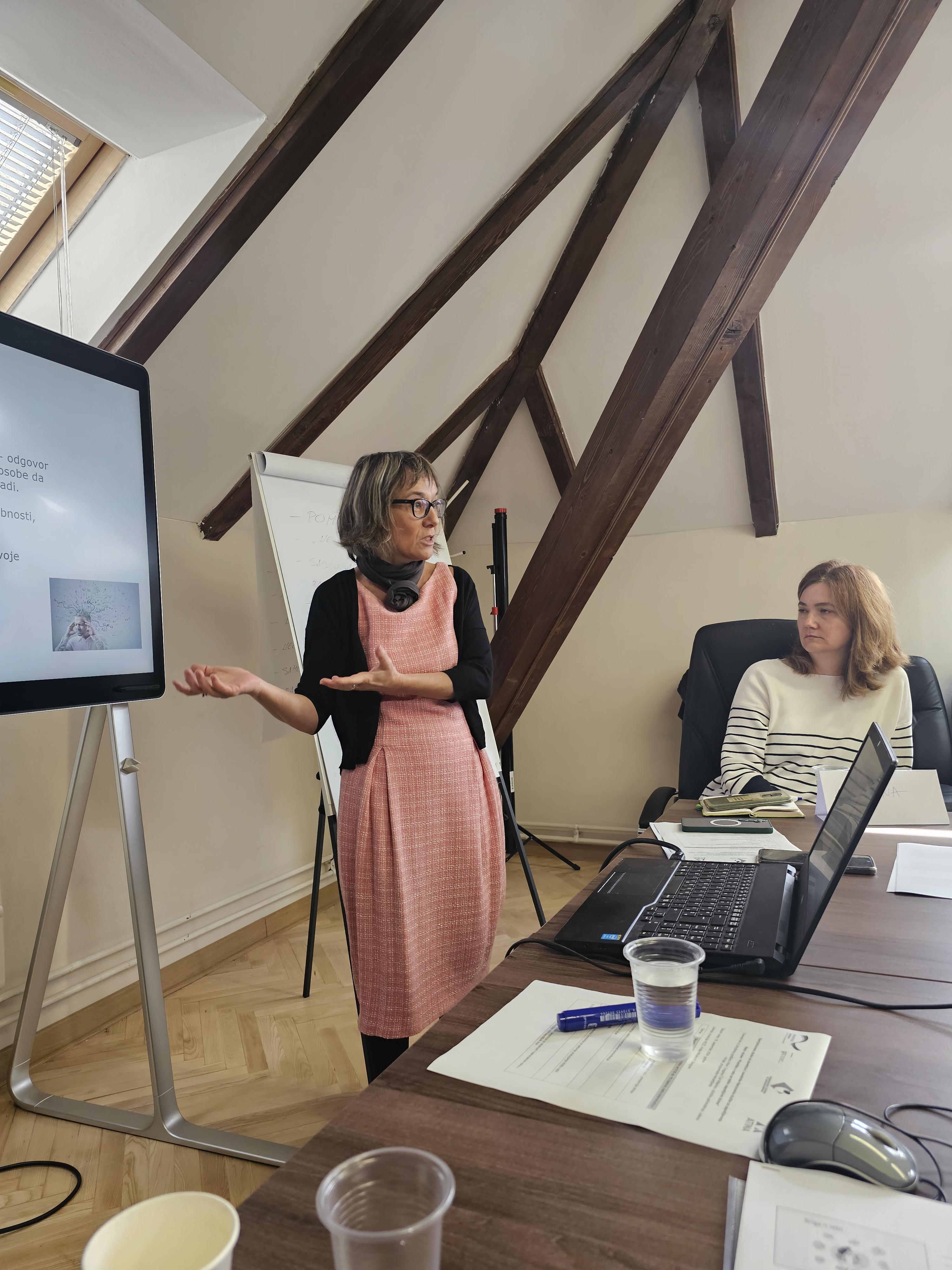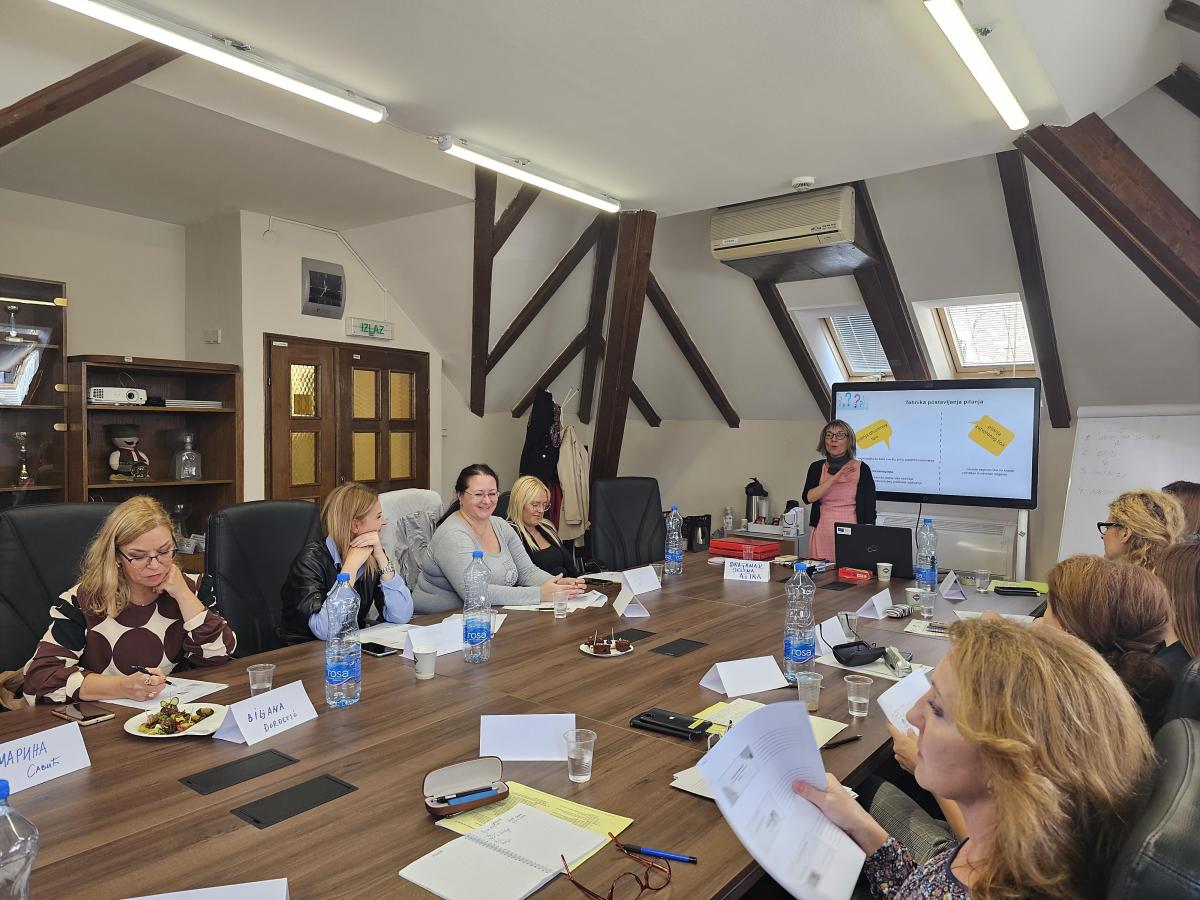Hotline: +381 61 63 84 071
Advancing Support for Hard-to-Employ Groups

Advancing Support for Hard-to-Employ Groups
Specialized Training for Counsellors of the National Employment Service
In the second half of 2024, NGO Atina implemented a specialized training program to strengthen counselors' capacity within the National Employment Service (NES) to support hard-to-employ individuals more effectively. The initiative was developed by a dedicated team composed of Dragana Ćuk Milankov as key expert, Jelena Hrnjak, and Zorana Pareanović as short-term experts. Their joint effort resulted in a tailor-made curriculum designed exclusively for NES professionals. It was rooted in real-world experience and tailored to address the evolving challenges faced in everyday counselling work.
The project was launched following a series of consultations with NES leadership and representatives of GIZ, in which the need for a comprehensive and practical training was identified. It was agreed that eight training sessions would be held across six cities in Serbia, including Belgrade, Novi Sad, Kragujevac, Niš, Čačak, and Užice, from early September to early December 2024. Each training session hosted around 13 to 15 participants, creating an interactive environment conducive to personal engagement and practical learning.
The training agenda was thoughtfully structured to cover four key areas: managing stress and preventing burnout in work with vulnerable groups; developing constructive communication skills; motivating beneficiaries for more active participation in the labor market; and creating a supportive network of associates on both the local and national levels. This training also underscored the critical importance of equipping employment counsellors with the tools and sensitivity needed to work with victims of human trafficking and domestic violence, who often face compounded barriers to entering or reentering the labor market. The methodology included visual presentations, case-based learning, group discussions, role-playing exercises, and post-training evaluations. All educational materials were distributed to participants in hard copy, including thematic PowerPoint presentations and a checklist for daily use focused on preventing the adverse effects of working with individuals who have experienced trauma.
Participants came predominantly from local NES branches, with 117 NES counselors and seven NES Directorate representatives totaling 124 attendees. The gender composition of the group was overwhelmingly female, with women making up 86% of the participants, while men accounted for 14%. The age structure revealed that most attendees were over 41, with a notable absence of professionals under 30. This trend, combined with the average work experience of 16 to 23 years, indicated a highly experienced group, but one that may require further support in adopting newer practices and tools in social work and employment counselling.
Feedback collected through evaluation forms revealed a high degree of satisfaction with both the content and delivery of the training. Over 90% of participants stated they were fully satisfied, highlighting the trainers' professionalism, clarity, and interactive approach. Around 80% reported gaining new knowledge and practical skills, particularly in stress and burnout prevention and communication strategies, which were rated with top marks for usefulness and applicability in daily work. Participants also emphasized the benefit of having space for active participation and peer exchange, which fostered a collaborative learning atmosphere.
The analysis of participant feedback also pointed to several important observations and future directions. There is a pressing need to increase the inclusion of younger professionals and men in such training initiatives by offering programs tailored to their needs and preferences. Many participants had never attended training sessions on key topics like working with hard-to-employ groups or managing occupational stress, underlining the importance of continued investment in professional development. Expanding the training content to include digital competencies and innovative approaches to employment counselling could also increase the effectiveness of future sessions.

Additionally, the introduction of mentorship programs was identified as a promising avenue to bridge generational and experiential gaps among staff. Given the wealth of experience current NES counselors hold, structured knowledge-sharing and peer support could significantly strengthen the service as a whole. Finally, improving evaluation tools to monitor the real-world application of training outcomes better will be crucial for refining and adjusting future capacity-building programs.
This training program represents a meaningful step forward in supporting NES professionals who work directly with some of society's most vulnerable groups. Through collaborative planning, evidence-based content, and a commitment to improving services, NGO Atina and its partners have contributed to building a more inclusive and responsive employment system in Serbia.












 FACEBOOK
FACEBOOK TWITTER
TWITTER YOUTUBE
YOUTUBE